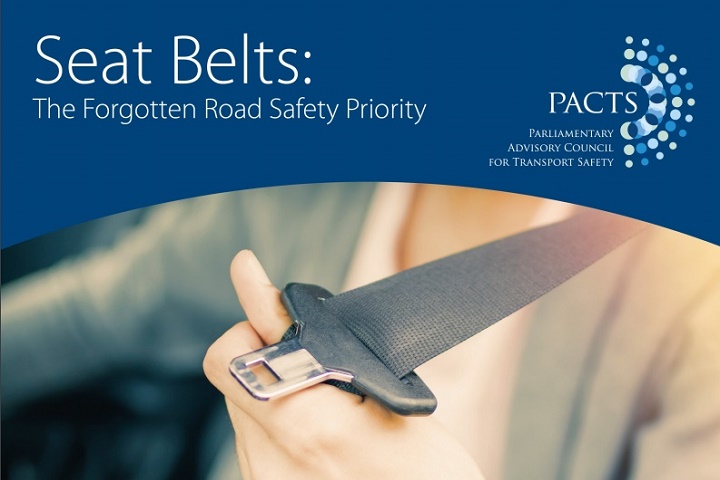
A new report is calling for the introduction of harsher penalties for those caught not wearing a seat belt – suggesting the road safety community has ‘taken its eye off the ball’.
Statistics show that despite compliance rates of 98.6% among British car drivers, 27% of those killed in cars in 2017 were not wearing a seat belt – amounting to more than 200 deaths.
The report, authored by the Parliamentary Advisory Council for Transport Safety (PACTS) in partnership with Direct Line, highlights interventions which should be employed to increase seat belt wearing rates.
Among the key recommendations is the introduction of three penalty points for not wearing a seat belt – which currently happens in Northern Ireland, but not in England, Scotland or Wales.
The report also calls for greater enforcement of the seat belt law through targeted, intelligence-led measures – and for existing road safety education activities to be reviewed to see if seat belt wearing is given due prominence.
David Davies, executive director of PACTS, said: “In the event of a collision, wearing a seatbelt is the single most effective thing that a driver or passenger can do to avoid serious injury.
“Our report shows the road safety community has taken its eye off the ball. It points to ways to increase wearing among the minority who forget or choose not to do so.
“In particular, PACTS recommends making it an endorsable offence, with three penalty points. This would have no impact on most drivers or passengers but could substantially reduce the number of people killed or seriously injured each year.”
‘Overwhelming support’ from the British public
To mark the launch of the report, PACTS and Direct Line has published the findings of a survey in which 72% of respondents support the introduction of penalty points for those found not wearing a seat belt.
Of those in favour of the introduction of penalty points, 58% of respondents believe three points would be an appropriate punishment, while 30% say the penalty should be six points – the same as those caught using a hand-held mobile phone.
5% of respondents believe flouting seat belt laws should result in an automatic driving ban of at least three months.
The current fine if issued a Fixed Penalty Notice for not wearing a seat belt is £100, just 20% of the average weekly wage in the UK, with a maximum penalty of £500 (if taken to court).
Good to see the debate. The report makes a number of recommendations. Three penalty points is the “big” one but only one of them. If you want to see the justification for this (Charles), read the report. All the interventions are assessed at length.
It is quite true that seat belt non-wearing often coincides with drink/drug-driving and other risky behaviour. But sometimes it is due to more mundane things – forgetting, inconvenience, assuming that air bags are sufficient, etc. PACTS does not assume that these interventions would prevent all unbelted deaths but, with over 200 killed and 1,000 seriously injured, there is certainly scope for improvement. Does anybody think we should NOT promote seat belt wearing??
David Davies
+2
Although Chris, those we see everyday not wearing belts are not necessarily impaired nor criminals – they’re just ‘couldn’t care-less drivers’ and don’t appear in the data because they haven’t crashed …yet.
Hugh Jones
--3
The Industry has missused data for so long it believes its own lies.
Stronger penalties, warning lights in vehicles all assumed to be plausible interventions?
Not when you investigate the data fully and discover the majority of unrestrained casualties were in vehicles used in the course of a crime or impaired through drink/drugs.
If we want to make a difference we need to tackle the root cause not the symptoms.
Chris Harrison, Bristol
+6
It certainly is NOT a forgotton road safety matter. We promote the need to wear seat belts at every opportunity and it is a key point in several annual campaigns and joint initiatives with the police and fire service. The high number of children that don’t always wear seat belts is a particular concern.
Pat, Wales
+12
The government policy is for a safe systems approach. Within that I would expect that the essential components to be viewed with the highest regard. It is therefore entirely sensible to compare different offences and their potential effects and hence also consider what deterrents should be applied. I therefore fully support the 3 points idea as the publicity alone will encourage even higher compliance.
Peter, Liverpool
--3
So we have a recommendation to make it an endorsable offence. I look forward to seeing the evidence that, presumably, the recommendation is based on. It will show that, beyond all reasonable doubt, such an action would result in significantly more than 98.6% of British car drivers wearing seat-belts.
Or is this yet another example of evidence-free road safety recommendations based on nothing more than a combination of prejudice, preconceptions, ignorance and with a dose of political bluster thrown in?
Charles, Wells
+4
What about head-on collisions Bob, or other circumstances where there is no escaping being hit by a vehicle coming towards you and your own following distance isn’t relevant?
Hugh Jones
+12
If in town one was to give approximately 100 ft of road space to the vehicle in front instead of the minimum distance of 30 ft recommended by the DVSA then we should not need to wear seat belts as we could all see more dangers or potential dangers and therefore take steps to avoid collisions or at least mitigate its impact by slower speeds after or whilst braking. The wearing of seat belts could reduce the degree of injury even further.
I think that the ‘Forgotten Road Safety Priority’ is actually the ‘Giving of Safe Following on Distances’. If drivers gave safe distance we would reduce the numbers of collisions quite dramatically.
R.Craven
--13